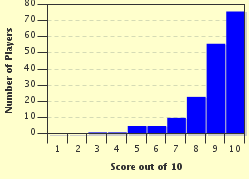Quiz Answer Key and Fun Facts
1. When is the mother advised to start breastfeeding her newborn infant?
2. What is the name for the first few drops of breast milk?
3. Breast feeding reduces the chances of the child having infections and provides protection against certain diseases in the long run.
4. Which of these hormones helps in the production of milk during lactation?
5. Among the long term benefits of breastfeeding to the mother are reduction in risks of ovarian and breast cancer and postpartum bleeding. Experts say that breastfeeding also has economic benefits.
6. What does the word 'weaning' mean?
7. What can cause difficulty in breastfeeding?
8. Can a woman who has had a mastectomy of just one breast still breastfeed?
9. What is overactive let-down?
10. The baby drinks milk from the breasts until they are emptied?
Source: Author
Saleo
This quiz was reviewed by FunTrivia editor
rossian before going online.
Any errors found in FunTrivia content are routinely corrected through our feedback system.


